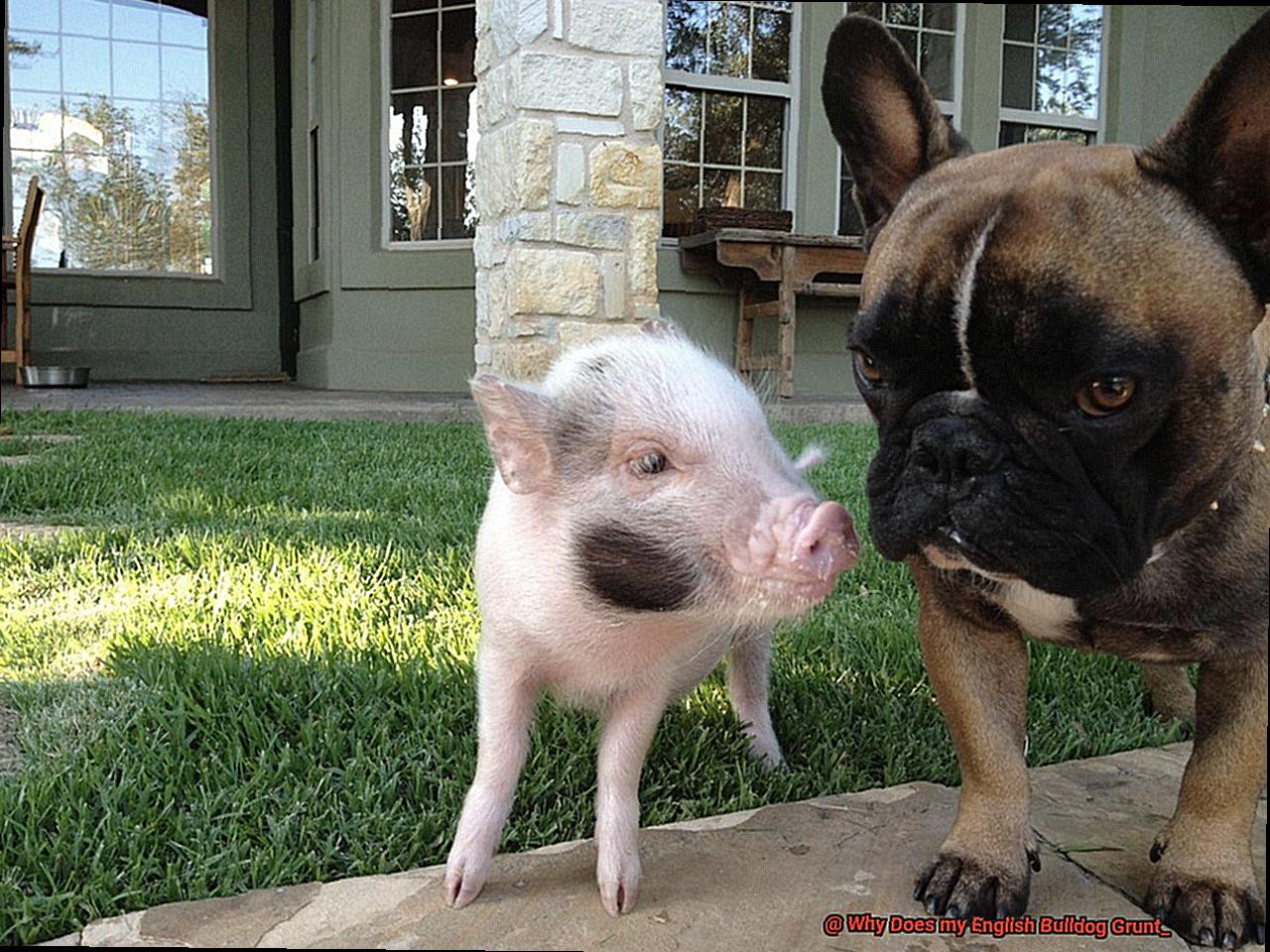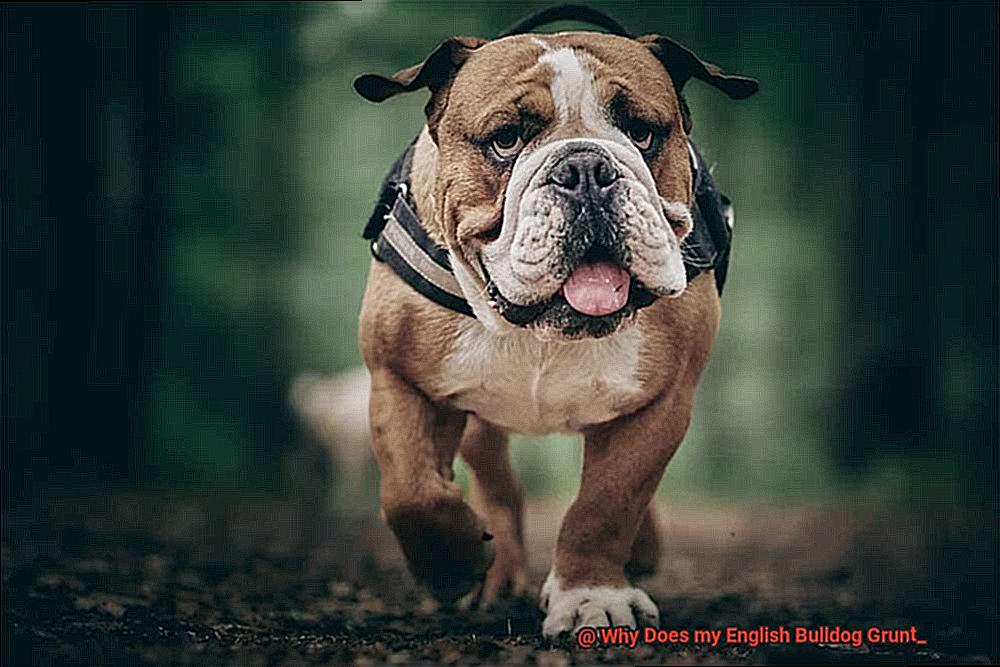Why Does my English Bulldog Grunt_?
Do you ever hear your English Bulldog grunting? Many owners of this breed have asked the same question.
Grunting is a common way of communicating with English Bulldogs, and understanding what it means will help you better understand your pup. Grunting can be used to express a range of emotions, from excitement to apprehension or even fear.
It’s also a way for them to ask for something – whether it’s food, love, or playtime. Knowing how to recognize these grunts will help you give them what they need quickly and effectively.
English Bulldogs are known as vocal species, so grunting is just one of the many sounds they make – including howling, snorting, and whining. Being aware of all these noises will help you better understand your pup’s needs and wants.
For more information about why does my English Bulldog Grunt?, click here.
Physical Characteristics of English Bulldogs that Lead to Grunting
Contents
- 1 Physical Characteristics of English Bulldogs that Lead to Grunting
- 2 Why Do English Bulldogs Have a Short Snout and Wrinkly Face?
- 3 How Does the Body Type of an English Bulldog Affect Their Grunting?
- 4 What is Brachycephalic Syndrome and How Does it Affect Grunting?
- 5 Other Reasons Why an English Bulldog May Grunt
- 6 Is It Normal for an English Bulldog to Grunt?
- 7 Signs That Your English Bulldog’s Grunting is a Cause for Concern
- 8 Tips on Reducing Your Dog’s Grunting
- 9 Conclusion
English Bulldogs are beloved for their charming looks, but their physical characteristics also make them prone to grunting.
Their flat faces, short snouts, and small nostrils can cause difficulty breathing, leading to a range of noises such as snorting, wheezing, and even grunting. Additionally, their heavy and muscular build adds extra pressure on their respiratory systems and can cause them to grunt more often.
And lastly, the wrinkles on their faces can obstruct airflow and cause noisy breathing. It’s important for English Bulldog owners to be aware of these physical conditions that lead to grunting.
Taking the necessary steps to care for your pup’s respiratory health will ensure they stay healthy and happy.
Why Do English Bulldogs Have a Short Snout and Wrinkly Face?
The short snout and wrinkly face of the English Bulldog have become iconic, making them one of the most beloved dog breeds.
However, these features can also lead to some serious health issues. Due to their brachycephalic skull, Bulldogs’ airways are significantly narrower than other breeds.
This can cause Brachycephalic Obstructive Airway Syndrome (BOAS), which leads to snorting, snuffling, and grunting as they try to breathe. Not only is this uncomfortable for the pet, but it can also be dangerous if left untreated.
The wrinkles on Bulldogs’ face can also be a source of health problems. If not properly taken care of, moisture and bacteria can build up in these folds and result in skin infections.
To prevent this, owners must make sure their pet’s face is clean and dry on a daily basis. English Bulldogs have an undeniably adorable appearance that many people adore.
But it’s important for owners to be aware of the potential health risks associated with their unique look.
How Does the Body Type of an English Bulldog Affect Their Grunting?
English Bulldogs are known for their adorable grunts, snorts, and snuffles.
But why do these lovable pups make such sounds? It’s all thanks to their unique body type.
The English Bulldog’s short stature and stocky build puts pressure on their respiratory system, which can lead to breathing difficulties and increased grunting. Their flat face, or brachycephalic skull, also contributes to their gyrations as it narrows the nasal passages and airways, making it harder for them to breathe.
Additionally, the breed’s wide muscular chest can push against the diaphragm when they become overly excited or engage in physical activity, resulting in more frequent grunting. It’s important to keep an eye out for excessive grunting or difficulty breathing as these could be signs of a more serious health issue such as an upper respiratory infection or airway obstruction.
Overall, although the English Bulldog’s unique body type makes them more prone to grunting than other breeds, these sounds are usually nothing to worry about – unless accompanied by other symptoms.
What is Brachycephalic Syndrome and How Does it Affect Grunting?
It could be a sign of Brachycephalic Syndrome.
Brachycephalic Syndrome is a medical condition that affects dogs with short, pushed-in noses and flat faces such as English Bulldogs, Pugs, and French Bulldogs. These breeds have a shortened upper jaw and elongated soft palate, which makes it difficult for them to breathe.
This condition leads to a variety of respiratory problems, including grunting, snoring, snorting, and wheezing. The main reason why Brachycephalic Syndrome affects grunting is because it narrows their airways.

When English Bulldogs try to breathe, the air passages in their nostrils and windpipes become blocked, making it hard for them to inhale oxygen. This forces them to work harder to get the air they need, leading to grunting, snorting, and snoring.
The irritation in their airways can also cause inflammation, infection, and even collapse – a severe form of respiratory distress that can be fatal. Additionally, Brachycephalic Syndrome can cause other health issues such as eye infections, skin fold dermatitis, heat exhaustion, and exercise intolerance.
They may advise lifestyle changes like monitoring your bulldog’s weight and providing appropriate exercise with special harnesses or collars designed to help support their breathing.
Other Reasons Why an English Bulldog May Grunt
English Bulldogs have a tendency to grunt for various reasons, from expressing boredom and discomfort to simply communicating with their owners.
Here are some of the most common causes for grunting in this breed. When they’re feeling bored or frustrated, English Bulldogs may grunt as a manifestation of their emotions.
As these dogs can be prone to anxiety and stress, it’s important to make sure they get enough exercise and mental stimulation to prevent them from becoming bored. Another possible cause for grunting is the hot weather.
Bulldogs have a short, wrinkled snout which can lead to breathing difficulties in humid climates. To ensure your pup is comfortable, provide them with access to a cool, well-ventilated space when the temperature rises.
Certain health conditions can also cause your bulldog to grunt more often than usual. Gastrointestinal issues may cause pain which leads to grunting, while respiratory problems such as difficulty breathing can be exacerbated by being overweight or not getting enough exercise.
If you notice that your pup is having difficulty breathing and is grunting more than normal, take them to the vet right away. Finally, some English Bulldogs may grunt simply because it’s their way of interacting with their owners.
Overall, if your English Bulldog is exhibiting excessive grunting behavior, it’s essential to investigate the root cause of their behavior.
Is It Normal for an English Bulldog to Grunt?
English Bulldogs are a beloved breed, and their unique look and sound make them stand out from other canines.
Many owners may find themselves wondering if the grunts and snores coming from their English Bulldog are normal or if there is cause for concern. The good news is that grunting is perfectly normal for this breed.
English Bulldogs are brachycephalic, meaning they have a short nose and flat face, making it difficult to breathe normally. As a result, they often use their nasal passages to produce grunt sounds as they breathe.
This is a natural response and usually not something to be worried about. However, excessive or persistent groaning could indicate an underlying health issue.
Additionally, some English Bulldogs may grunt more than others due to individual anatomy or personality traits, so it’s important to track your dog’s behavior and seek medical advice if you notice any changes or concerns.
Signs That Your English Bulldog’s Grunting is a Cause for Concern
While it’s normal for these dogs to make these sounds due to their physical appearance, there are certain signs that could be a cause for concern.
If your Bulldog is having difficulty breathing or seems to be struggling to get enough air, it could be an indication of a respiratory infection or other health issue. Furthermore, pay attention to any changes in their energy levels or behavior, such as lethargy or aggression, as this could also be a sign of an underlying health condition.
It’s also important to monitor any changes in your dog’s appetite or weight loss, as this could indicate a digestive disorder. If your Bulldog’s grunting is accompanied by any of these behaviors, it is essential to seek veterinary care immediately.
Early detection and treatment can help prevent further complications and ensure that your pet receives the necessary medical attention they need.
Wa1AyLwtDyM” >
Tips on Reducing Your Dog’s Grunting
If so, you may have noticed that your four-legged buddy is quite vocal. These dogs are renowned for making a variety of sounds, from snuffling and snorting to grunting and groaning.
If your Bulldog’s yelling is getting out of control, there are some ways to minimize it. Here are five tips on reducing your dog’s grunting:
Regular Exercise
The best way to keep your dog healthy and happy is to make sure they get plenty of exercise. Daily walks, runs, and playtime can help reduce your bulldog’s stress and anxiety levels, which may cause them to grunt less.
Diet Management
A well-rounded diet can help keep your dog healthy and reduce their grunting. A balanced diet will help keep your bulldog’s weight under control, which in turn will reduce the strain on their respiratory system and help minimize grunting.
Massage and Physical Therapy
Petting your bulldog and giving them regular massages can help reduce their stress levels and make them feel more relaxed. Physical therapy like stretching can also help relieve any breathing difficulties they may experience, reducing their need to grunt.
Regular Vet Visits
Regular check-ups with a veterinarian can help catch any potential health problems early on. Respiratory issues that can cause grunting are relatively common in English Bulldogs, and a vet can help you manage them before they become a more significant issue.
Breeding Selection
If you’re considering getting an English Bulldog, ensure you choose a breeder that prioritizes healthy breeding practices. Selecting a bulldog with good respiratory and overall health can help reduce the likelihood of grunting.
Also Read: How Do I Know If My English Bulldog Is Happy?
Conclusion
Grunting is a normal way of communication for English Bulldogs, so it’s important to understand what your pup is trying to tell you.
Though it’s usually nothing to worry about, grunting can be indicative of health issues such as Brachycephalic Syndrome or an upper respiratory infection. To help keep your Bulldog healthy and happy, ensure they get plenty of exercise, a balanced diet, regular vet visits and massage and physical therapy.
At the end of the day, English Bulldogs are lovable creatures with unique personalities and quirks that many people love.




